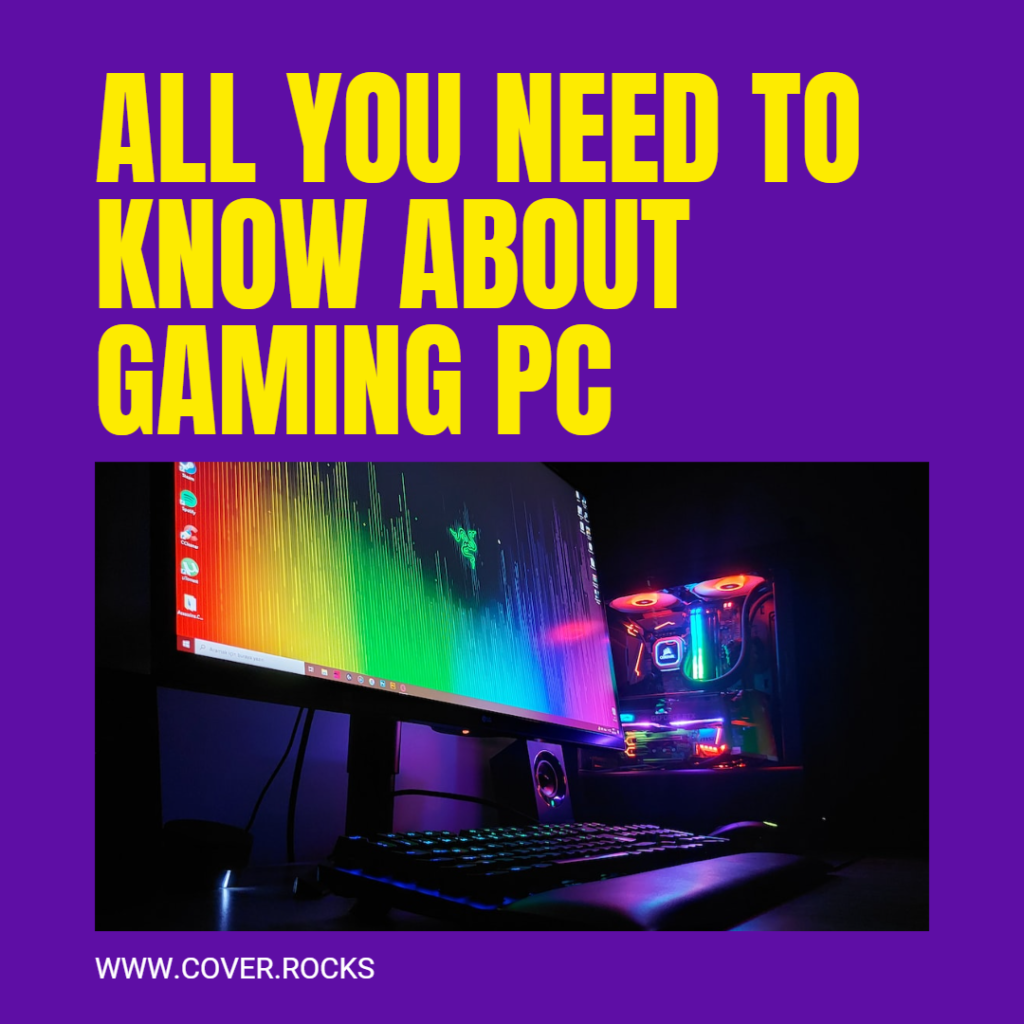A gaming PC is a type of computer designed to provide an optimal gaming experience. It is built with high-performance components such as a powerful processor, dedicated graphics card, fast memory, and other components designed to enhance the gaming experience.
Here Are The Details Of The Different Components Of A Gaming PC:
- Processor (CPU): The processor is the brain of the computer and is responsible for processing data. A powerful processor is essential for gaming as it determines how quickly the computer can process information and respond to user input. Popular brands include Intel and AMD.
- Graphics Card (GPU): The graphics card is responsible for rendering images and video on the screen. A dedicated graphics card is essential for gaming as it is designed to handle the demands of modern games. Popular brands include NVIDIA and AMD.
- Memory (RAM): Memory is temporary storage that the computer uses to store data it is currently working with. Gaming PCs require at least 8GB of RAM, but 16GB or more is recommended.
- Storage: Gaming PCs require fast storage to reduce loading times and provide better gaming performance. Solid-state drives (SSDs) are faster than hard disk drives (HDDs) and are recommended for gaming.
- Power Supply Unit (PSU): The PSU is responsible for providing power to the other components in the computer. A powerful PSU is required for gaming as it needs to provide enough power to run the CPU and GPU.
- Motherboard: The motherboard is the backbone of the computer and connects all the components together. It needs to be compatible with the other components in the computer.
- Cooling: Gaming PCs generate a lot of heat, so proper cooling is essential to prevent overheating and damage to the components. A combination of fans, heatsinks, and liquid cooling can be used to keep the computer cool.
- Peripherals: Gaming PCs require peripherals such as a monitor, keyboard, and mouse. A high refresh rate and low latency monitor is recommended for a better gaming experience.
A gaming PC is a computer system designed specifically for playing video games. It typically has high-end components such as a powerful processor, dedicated graphics card, and fast memory, and is capable of running the latest games at high frame rates and resolutions.
Advantages of a gaming PC:
- High performance: A gaming PC offers higher performance than a standard PC, making it ideal for playing the latest games.
- Customization: Gaming PCs can be customized to suit individual preferences, such as the type of case, lighting, and peripherals.
- Graphics quality: A dedicated graphics card provides superior graphics quality, allowing for higher resolutions and more detailed visuals.
- Upgradeability: Gaming PCs are highly upgradeable, so users can replace or upgrade individual components as needed to keep up with the latest technology.
- Multi-purpose: A gaming PC can also be used for other tasks such as graphic design, video editing, and programming.
Disadvantages of a gaming PC:
- Cost: Gaming PCs can be expensive, especially if you want the latest and most powerful components.
- Complexity: Building a gaming PC can be complicated and time-consuming, especially if you are not familiar with the hardware.
- Maintenance: Gaming PCs require regular maintenance, such as cleaning and updating drivers, to keep them running smoothly.
- Power consumption: Gaming PCs consume more power than standard PCs, which can lead to higher electricity bills.
- Compatibility issues: Compatibility issues can arise when upgrading or replacing components, which can be frustrating for users who are not familiar with the hardware.
In summary, a gaming PC offers high performance, customization, and graphics quality, but it can be expensive, complex to build and maintain, and may have compatibility issues.
Before setting up a gaming PC, here are some things to keep in mind:
- Budget: Determine how much you are willing to spend on the PC, and allocate the funds accordingly.
- Compatibility: Ensure that all the components are compatible with each other, especially the motherboard, processor, and graphics card.
- Processor: Choose a processor that is powerful enough to handle the demands of the latest games. Intel and AMD are the most popular brands.
- Graphics Card: A dedicated graphics card is essential for a good gaming experience. NVIDIA and AMD are the most popular brands.
- Memory: At least 8GB of RAM is required for gaming, but 16GB or more is recommended.
- Storage: A solid-state drive (SSD) is recommended for faster load times, but a hard disk drive (HDD) can also be used for extra storage.
- Power Supply: Choose a power supply unit (PSU) that can provide enough power for all the components.
- Cooling: Proper cooling is necessary to prevent overheating and ensure optimal performance.
- Peripherals: Don’t forget to budget for peripherals like a monitor, keyboard, and mouse.
- Operating System: Decide on which operating system to use, such as Windows or Linux, and ensure that all components are compatible with it.
In summary, a gaming PC is a computer designed for gaming, built with high-performance components such as a powerful processor, dedicated graphics card, fast memory, and other components designed to provide the best gaming experience.



